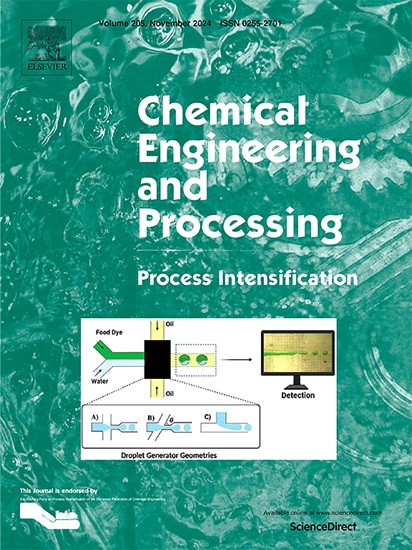生物柴油连续生产工艺优化与控制研究进展
IF 3.8
3区 工程技术
Q3 ENERGY & FUELS
Chemical Engineering and Processing - Process Intensification
Pub Date : 2025-04-15
DOI:10.1016/j.cep.2025.110323
引用次数: 0
摘要
生物柴油是一种生态友好、低毒的生物燃料,可以减少温室气体排放,使其成为化石燃料的有前途的替代品。生物柴油的生产需要脂质与醇的酯交换反应,这一过程严重依赖于高效的催化剂和优化的反应器设计。间歇式反应器存在停留时间长、运行费用高、能耗大、生产效率低等问题。为了解决这些问题,科学家们目前正在集中研究连续流生物柴油生产方法。目前对生物柴油生产的研究主要集中在利用过程强化方法来解决主要挑战。这些方法包括新的反应器配置和组合反应/分离程序,以提高反应速度,降低醇油比,原位产物分离,并最大限度地减少能源消耗。在这些进步的帮助下,可扩展装置的连续生产已经成为可能,导致各种技术的成功商业化。在这些进展的基础上,本文回顾了二十年来连续生产生物柴油的研究,探索了过程模拟、优化和控制方面的问题。它进一步深入研究了过程强化、规模化方法和技术经济分析的策略,提供了对该领域进展和未来潜力的全面了解。本文章由计算机程序翻译,如有差异,请以英文原文为准。

Optimization and Control of Continuous Biodiesel Production Processes: A Review
Biodiesel is an eco-friendly, low-toxicity biofuel that reduces greenhouse gas emissions, making it a promising alternative to fossil fuels. Biodiesel production requires the transesterification of lipids with alcohol, a process heavily dependent on efficient catalyst and optimized reactor design. Batch-type reactors present challenges such as extended residence time, high operating expenses, significant energy consumption with limited production efficiency. To address these issues, scientists are currently concentrating on continuous flow biodiesel production methods.
Current studies on biodiesel production have concentrated on utilizing process intensification methods to tackle major challenges. These methods involves novel reactor configurations and combined reaction/separation procedure that boost the reaction speeds, decrease the alcohol-to-oil ratio, in-situ product separation, and minimize energy usage. With the help of these advancements, continuous production in scalable units has become feasible, leading to the successful commercialization of various technologies. Building on these advancements, this review examines two decades of research on continuous biodiesel production, exploring process simulation, optimization, and control aspects. It further delves into strategies for process intensification, scale-up methodologies, and techno-economic analysis, offering a comprehensive understanding of the field's progress and future potential.
求助全文
通过发布文献求助,成功后即可免费获取论文全文。
去求助
来源期刊
CiteScore
7.80
自引率
9.30%
发文量
408
审稿时长
49 days
期刊介绍:
Chemical Engineering and Processing: Process Intensification is intended for practicing researchers in industry and academia, working in the field of Process Engineering and related to the subject of Process Intensification.Articles published in the Journal demonstrate how novel discoveries, developments and theories in the field of Process Engineering and in particular Process Intensification may be used for analysis and design of innovative equipment and processing methods with substantially improved sustainability, efficiency and environmental performance.

 求助内容:
求助内容: 应助结果提醒方式:
应助结果提醒方式:


